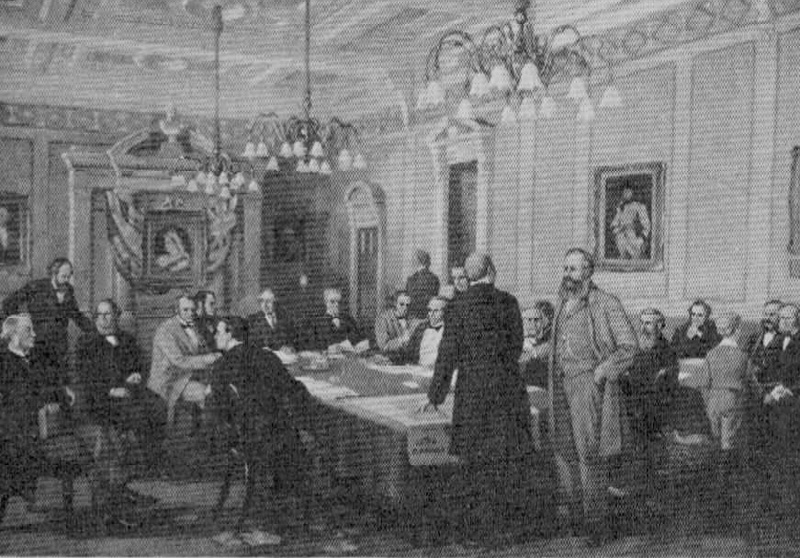
HISTORICAL EVENTS THAT TOOK PLACE ON THIS DAY IN CANADA
8 March

Canadian delegates in London, December, 1866
Commons Pass B.N.A. Act
On March 8, 1867, the British North America Act was passed by the House of Commons in Britain, less than a month after it had been introduced in the House of Lords. It was a speedy job of legislation, so much so, that the Canadian delegates were a little "miffed" because it had not caused more debate. John A. Macdonald grumbled: "The English behave as though the British North America Act was a private bill uniting two or three parishes."
Some British M.P.'s were suspicious that the bill was being rushed through, but the only man who offered any opposition was John Bright, free-trader and reformer. In this case, he was on the side of the underdog, Joseph Howe, who had been in London since July trying to keep Nova Scotia out of Confederation.
Howe even went to Lord Carnarvon and claimed that fifty-two of the seventy-two resolutions leading to the British North America Act had been drawn up by Macdonald who had probably been drunk at the time. Carnarvon, greatly upset, wrote to Governor General Lord Monck in Canada asking him to investigate. Evidently he was reassured because the bill went through without delay.
John Bright tried to have the bill set aside by criticizing the colonial system generally. He said that if the provinces of British North America were going to keep asking Britain for money for defense and railways, then it would be better if they were given their independence and paid their own way.
M.P.'s were so little concerned that many of them were not in their seats when the British North America Act got its final reading on March 8. They came rushing in immediately after, because the next item of business was a bill to place a tax on dogs, and most of them owned dogs!
The British North America Act was officially proclaimed on March 29, and Queen Victoria set July 1 as the date for Confederation.
OTHER NOTABLE EVENTS ON THIS DAY IN CANADIAN HISTORY
8 March
-1765 The House of Lords passed the Stamp Act, one of the aggravations that led to the American Revolutionary War.
-1799 David Thompson was exploring along the North Saskatchewan River.
-1836 The New Brunswick and Canada Railway received a charter to operate between St. Andrews, New Brunswick, and Quebec City.
-1837 The Bank of British North America opened in Montreal.
-1855 The Niagara Suspension Bridge was opened.
-1873 The Northwest Territories Council prohibited the sale of liquor.
-1907 The Supreme Court of Saskatchewan was established.
-1922 The first session of the Fourteenth Parliament opened with W. L. Mackenzie King as Prime Minister. Legislation included the establishment of the Department of National Defence.